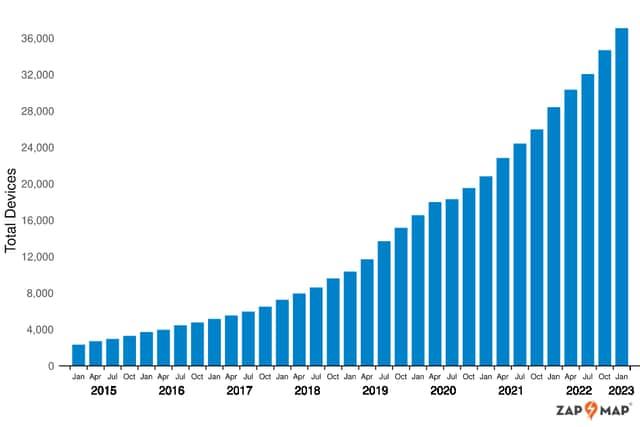EV charging points UK: government ‘will miss EV charger target by 20 years’, Labour says
and live on Freeview channel 276
The government will miss its own targets on public electric car chargers by 20 years, according to opposition politicians.
Labour has accused the government of being “asleep at the wheel” after new data from the Department for Transport (DfT) revealed that fewer than 9,000 new public chargers were installed in 2022.
Advertisement
Hide AdAdvertisement
Hide AdData from the DfT revealed that at the end of 2022 there were 37,055 public EV chargers in Britain - an increase of 31% over the start of the year. However, the DfT has stated it wants nearly 10 times that many chargers in place by 2030.
It set ambitious targets for 300,000 public chargers to be operational by the time of the ban on new petrol and diesel vehicles but at current growth rates looks set to fall far short of that.
Now motoring groups are calling for the government to support the faster rollout of infrastructure and to set clear interim targets for chargepoint installations to ensure they keep pace with the rapid uptake of EVs.
The figures from the DfT show that in the last three months of 2022, an additional 2,418 chargers were installed around the UK, including 492 rapid or ultra-rapid devices. However, to meet the target of 300,000 chargers by 2030, the country needs almost four times as many chargers - 9,391 - to be installed every quarter.
Advertisement
Hide AdAdvertisement
Hide AdOver the course of last year the number of chargers rose by 8,680 but around 37,564 new chargers are needed annually to hit the 2030 target.
Labour’s shadow transport secretary Louise Haigh told the House of Commons that at current rates the government would miss its target by 20 years, adding: “There is no time to lose on charging infrastructure, but the Conservatives are asleep at the wheel. Never-ending chaos in the Conservative government has delayed key projects and risks stalling the switch to electric vehicles, leaving our world-class car industry in limbo.”


Sales of electric cars have soared in the last year, overtaking diesel to become the second most popular powertrain after petrol. A total of 267,203 new EVs were registered in 2022 - a 40% increase on 2021.
There are already concerns about the ratio of vehicles to chargers and the AA’s head of roads policy, Jack Cousens, warned that rapid action was needed to ensure infrastructure could cope with the growing demand. The ratio of vehicles to chargers has shifted from one charger per 16 cars in 2020 to one per 30 cars in 2022.
Advertisement
Hide AdAdvertisement
Hide AdCousens commented: “New EVs are flying off the factory floor, but we desperately need charge point installations to keep pace with an ever-growing demand.
“With a target of 300,000 publicly available charge points by 2030 and just 37,055 installations in place, more focus is needed to accelerate the nation’s charging infrastructure.
“We urge the government to set marker post targets in place so drivers can see the progress is being made while giving those nervous to switch the confidence to do so.”
RAC head of roads policy Nicholas Lyes said the government needed to make it easier for private firms to open new charging locations. He said: “It’s all well and good having a zero-emission vehicle mandate for car manufacturers but if public charging isn’t keeping pace with EV registrations, then drivers will quickly become disillusioned and frustrated.
Advertisement
Hide AdAdvertisement
Hide Ad“Data already shows a record number of electric vehicles per public charging point, so we strongly urge the Government to introduce annual installation targets and do whatever it takes to make it easier for operators to install new charging hubs.
“It should also be noted that rapid and ultra-rapid chargers currently account for just a fifth of all the network and are growing at a slower rate. If people are to make longer journeys quickly and easily, we need to eradicate the rapid charging ‘deserts’ that exist and make the fastest possible chargers available much more widely.”
The DfT data, sourced from Zap-Map, shows that while there are an average of 10.3 rapid chargers per 100,000 people, provision varies wildly. In Scotland there are around 17 rapid chargers per 100,000 but in Northern Ireland there are just 1.4 per 100,000.
A DfT spokesperson said: “We want to maximise the opportunities available for motorists to switch to electric vehicles and have spent more than £2 billion to accelerate the transition.
“Alongside industry, we have supported the installation of over 37,000 publicly available charge points and expect this to expand tenfold by the end of the decade.”
Comment Guidelines
National World encourages reader discussion on our stories. User feedback, insights and back-and-forth exchanges add a rich layer of context to reporting. Please review our Community Guidelines before commenting.
